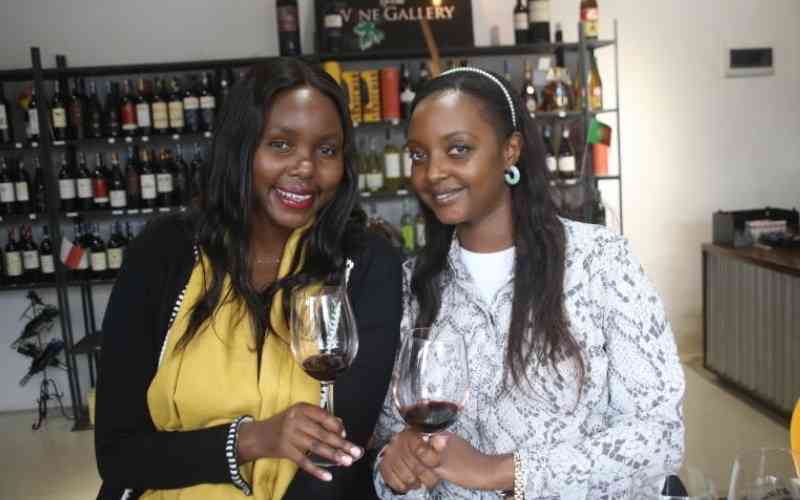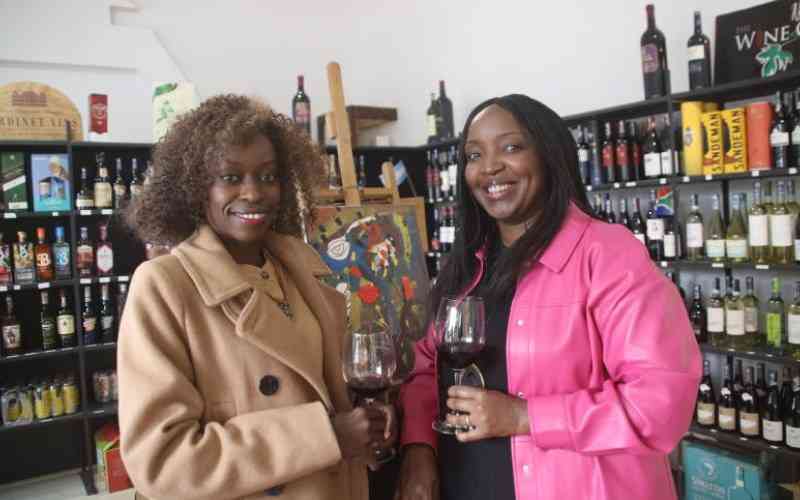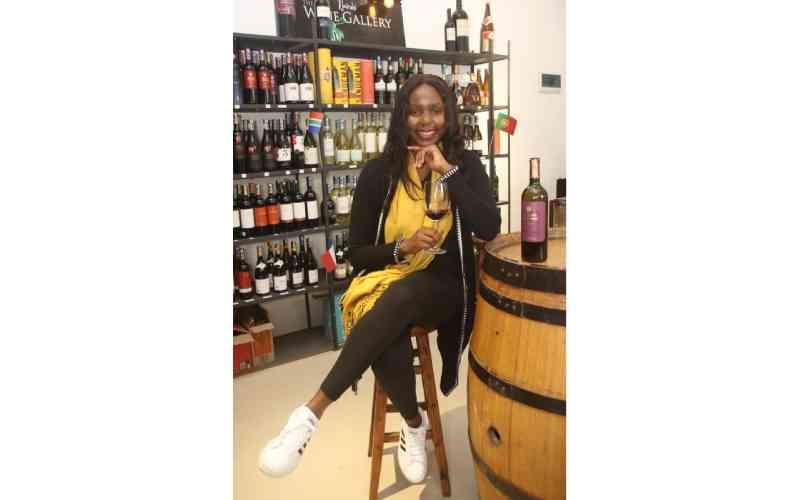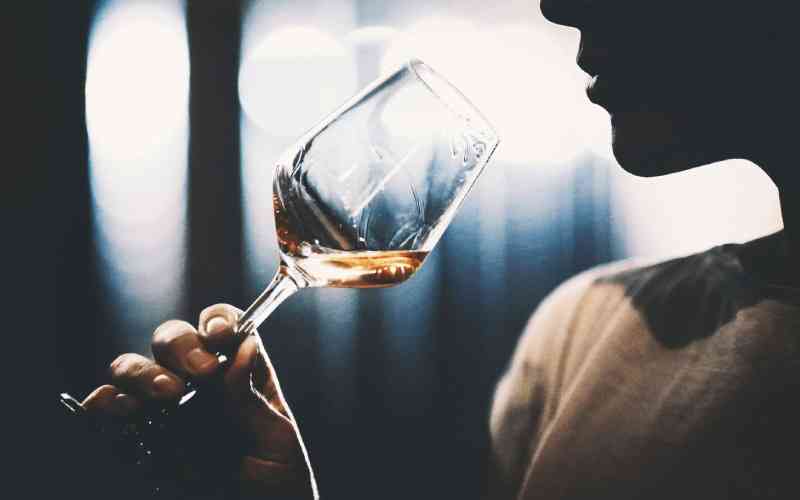
The sound of clinking glasses, and the smell of pizza wafts from across a nearby restaurant. Five ladies and one gentleman sit across from each other, and there are dozens of wine bottles and glasses on the table.
They are doing several things - holding their wine glasses over a white napkin and observing the colour. They are also swirling, sniffing, tasting, appearing to appreciate its taste briefly before spitting out the drink into a small bucket and rinsing their mouths with water.
Words like 'aroma', 'calibrate', 'sommelier' and statements like 'open it up' are in use, along with lots more wine vocabulary. These are the sights and sounds that meet The Standard team as we join Team Wine Kenya for a wine-tasting session at The Wine Gallery in Westlands, Nairobi.
It is a Wednesday afternoon, and the team, made up of the ladies, has left various commitments to rush over to the tasting because it is serious business for them and not just fun. They are practising for a wine-tasting competition, the World Blind Tasting Championships set to take place in October. We learn that most of these women are involved in the wine industry in one way or another.
Whether they have learnt about the industry through family businesses or from diving into the wine scene altogether, one thing unites them - the undeniable passion they have for the drink and the culture that surrounds it.
"That is a Rioja from Spain, 2015, a very well-aged and well-known wine," Victoria Mulu- Munywoki says as we pull her aside for an interview. She offers us a choice between two wines as we sit.
"It is a more accessible wine in terms of the pleasure points on your pallet - they are reached faster. This other one is a bit more restrained and difficult to understand. And it is because of the vilification and the grape varietal that has been used," she says, explaining the difference between the two bottles she chose.
It is clear that she has a mastery of the art of wine tasting, and it is bound to be a learning experience. Victoria's colleagues describe her as a veteran of the craft, a professional, and she explains that she was awakened to the deep cultural element of wine after having lunch with her then-boss years ago.
"I am a wine consultant and sommelier. To be in the team, you must be in the wine industry and that way you have the technical ability to describe the wine and you can relate to other team members," she says about the role she plays.

How does one get into wine tasting?
Victoria says her exposure to the world was one of the factors that led her deeper into the art of wine tasting. Experiencing different parts of the world through travel helped, and she also did her wine courses abroad. Yes - there are syllabi specifically made for wine tasting - a curriculum and certificates that one can attain to become a professional in the craft.
"The advantage that I had is that I had done my wine courses in Europe before I moved back home. I also have varied interests and experiences in life that can relate to wine tasting. For example, if you are talking about Italian wine you have to be able to imagine the place and understand why it tastes like that. Because wine is a reflection of where it's grown, the people who grow it and the grape itself," Victoria says.
The wine connoisseur says that as long as you have a good pallet, you can take on the craft and become good at it.
"More than 20 years ago, when I was working in Europe - the Europeans had wine at lunch, it is a culture. So I went out with my boss at the time and he ordered a glass of wine for me. And I was challenged and I wondered, how do I find out more?" the Team Wine Kenya captain said.
She added: "I saw the passion and how people were describing it. That was around 1998. In any competition, nerves are good, and we are nervous. But we can win."

For the laymen - how do you tell the difference between a cheap wine and an expensive one?
Victoria says that it is easy.
"Let us not use 'cheap', because everything has its expenses. We could call it low quality. Low-quality wine will have a 'short finish'. When you sip and swallow, you have to think about how long the flavours last in your mouth with it open. If you can still taste the fruit, something sweet, maybe cinnamon - the longer the flavours last in your mouth the better the quality of the wine."
She adds: "But if you sip wine and swallow it and it is almost like drinking water, that tells you the quality is low. The longer the finish, the better the quality. Complexity is also important - does the wine have more than one or two flavours?"
We jump into some tips and etiquette to observe while drinking wine, like "hold it by the stem never by the bowl, because your palm is a warm part of the body and it will affect the temperature of the wine."

Diane Chimboza (Managing Director, Under The Influence), a wine importer and coach for the team says that being in the wine industry brought the ladies together to create an exemplary team for the competition ahead.
"They want to do better than they did last year, so there is a lot of drinking. And it is not drinking to get drunk, it is to get technical on wine."
She adds: "We want to represent Africa and women in wine. We must get to show the diversity in the industry."
Judy Ngene, a team member who will be competing this year says that she is in the wine space as an importer at Galina Agency, which she runs alongside her mother.
She tells us how she got into wine tasting. "As an importer, you have to taste the wines that you bring in. We started with going on wine expeditions in Germany. There is one huge one called the ProWein, it is there every year, and everyone in the wine space usually showcases and samples all their wine in a business forum. With that, you taste so many wines, and that is how I got into tasting," she says.
Judy adds that after getting more exposed to the culture of wine, she took up certification courses to become a professional - something common among all Team Wine Kenya members.
Lorna Kipkosgei, a sommelier and wine content creator is another member of the team. She describes her journey as one sparked by the need to inform herself about the vibrant wine culture that she could see on TV and online.
"My background is in the marketing side, but I decided to change my career quite early after I found myself gravitating towards the wine industry more. What caught my attention is when I would want to buy some wine. Walking into the supermarket and finding that the attendant knows nothing about the product was something major I noticed early on," Judy says.
She adds: "I noticed there was a huge gap for the consumer education and the sellers too. I wanted to decipher what wine is and educate Kenyan consumers about what it entails. It was passion and purpose combined."
To learn, she signed up for and attended a school, WSET Global, for the proper certification courses.
We speak to Joy Adero, who competed last year and is eager to take up the challenge this year too.
"I am first and foremost a wine enthusiast. I enjoyed wine experientially and found it so immersive that I wanted to always learn more. Come 2019 I had the opportunity to take the certification with the WSET, which had recently come into the country," she says about getting into the art.
She topped both classes in her courses despite not being in the wine industry, which encouraged her to pursue wine tasting further. How do you tell the difference between one wine from the other?
Joy explains the art of wine tasting: "You have to have the background, study it and become familiar with the different wines and how they present. Using your senses, nasal, visual, olfactory, use a process of elimination."
She adds more wine-drinking etiquette tips to our lesson for the day. "When they say room temperature, they mean cellar temperature in France (a temperate country). That should be around 18 degrees here, not your hot 28-degree temperature in Nairobi. So even red wines need to be chilled a little bit."
She encourages those just learning about wine not to be intimidated, to ask questions and research.
"Wine is there for you to enjoy. Do not think that you are not sophisticated enough to enjoy it, so drink it!"
It is all about responsibility and self-control for the team members, all who note that practice is one thing and drinking is another. They watch their consumption and are strict when it comes to study versus fun.
"If you are studying, you cannot enjoy. If you are enjoying yourself, you cannot study. As we get closer to the competition, I find myself tasting more instead of drinking for enjoyment. It is a fine line, but responsibility is key," Joy Adero says.
 The Standard Group Plc is a multi-media organization with investments in media
platforms spanning newspaper print
operations, television, radio broadcasting, digital and online services. The
Standard Group is recognized as a
leading multi-media house in Kenya with a key influence in matters of national and
international interest.
The Standard Group Plc is a multi-media organization with investments in media
platforms spanning newspaper print
operations, television, radio broadcasting, digital and online services. The
Standard Group is recognized as a
leading multi-media house in Kenya with a key influence in matters of national and
international interest.









